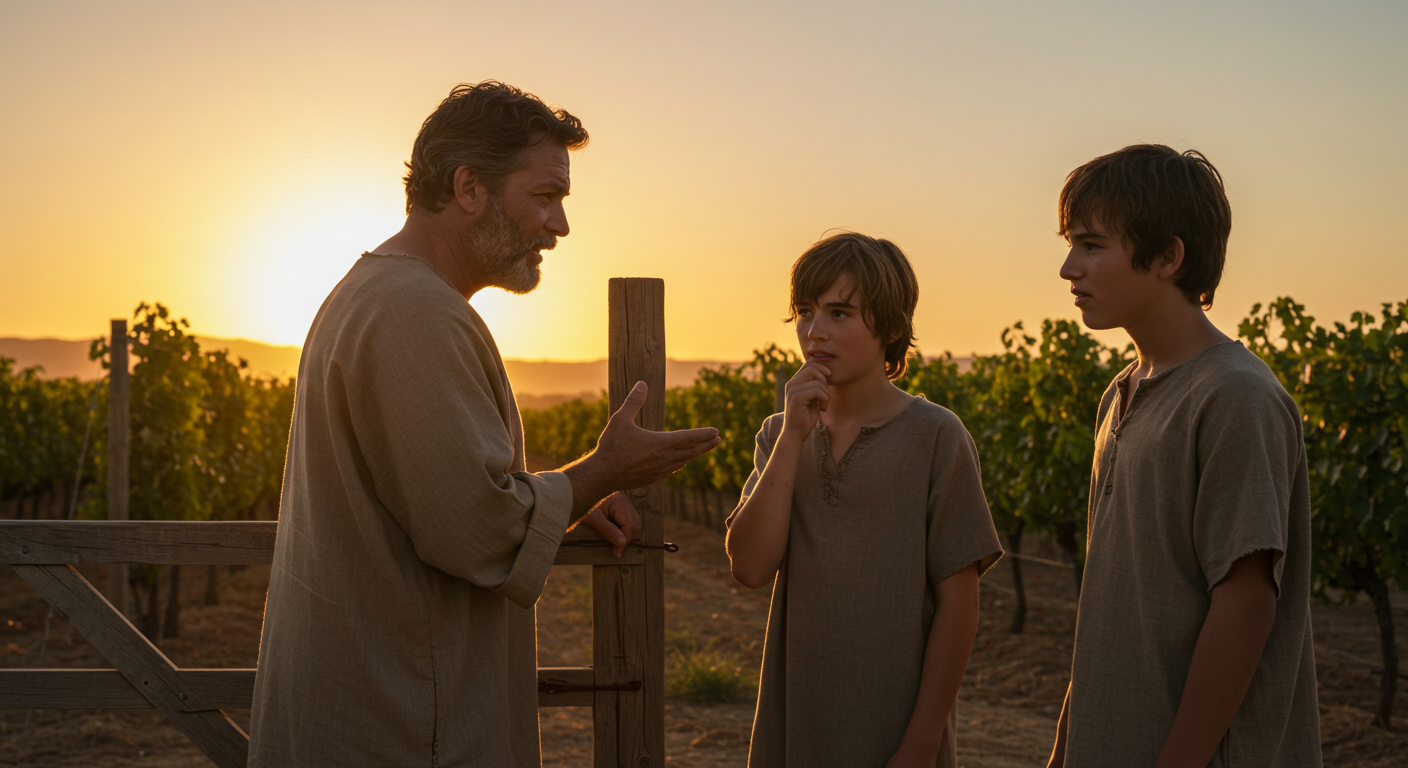Parable of the Two Sons (Lessons in Obedience)
Let’s dive into a lesser-talked-about but profoundly relevant parable from the Bible—the Parable of the Two Sons. If you’re already intrigued, it might be because the title alone resonates with something in your day-to-day life. Maybe it’s the promise of “I’ll do it later” that echoes in your mind. Let’s walk this journey of understanding together, focusing on lessons of obedience, immediate action, and the humble acceptance of our fallibilities.
Unpacking the Parable of the Two Sons
First things first, what is the Parable of the Two Sons all about? This story can be found in the Gospel of Matthew 21:28-32. Jesus uses this parable to illustrate a deep point about obedience and the kingdom of God. Here’s the gist: A father asks his two sons to work in the vineyard. One son says “No” but later changes his mind and does the work. The other son says “Yes,” but never actually goes. Simple, right? Yet, deeply profound.
What makes this tale fascinating is not just the eventual actions of the sons, but also the initial responses—and how they make us reflect on our own. The son who initially refuses but ultimately complies displays a remarkable turn of heart. Meanwhile, the son who agrees verbally but fails to follow through presents an examination of empty promises.
“I’ll Do It Later” vs. Immediate Obedience
Isn’t it easy to say, “I’ll do it later”? When faced with immediate action, aren’t we all a tad tempted to procrastinate or dodge daunting tasks? The Parable of the Two Sons urges you to consider how these habits may affect your relationship with your ambitions, responsibilities, and even your spiritual calling.
When you say “later,” what do you really mean? Is it a lack of urgency, or perhaps an avoidance of accountability? One of the sons epitomizes what it truly means to show intent without follow-through. It’s a caution; it nudges you to dig deep and evaluate those areas in your life where you’ve promised change but haven’t acted.
In stark contrast, immediate obedience—while difficult—brings swift progress. It’s the antidote to inertia. Embarking on even small tasks promptly can result in a cascading effect of accomplishments, boosting not just your morale but also cementing your sincerity in obligations.
Why Intent Matters and What Gets in the Way
You might wonder why intent is so crucial if it seems like just talk. Intent carves out your initial path and maps your potential actions. However, intent without follow-through is like planting seeds and never watering them. The Parable of the Two Sons puts this dilemma under the microscope, inviting introspection on why the path from intent to action can so often be fraught with potholes.
Perhaps it’s fear of the unknown or a lack of motivation that puts your intent on pause. Sometimes, complacency breeds a false sense of security. You say, “It’s not urgent,” until it inevitably becomes paramount. Identifying these roadblocks can be liberating, offering you a clearer route to actual change.

Next Steps: How to Break the Procrastination Cycle
Acknowledging where you’ve fallen into these traps is just the first step. Taking action is what will break you free from these habits. Here’s a simple exercise to get you started: make a list of ten things you’ve committed to—big or small. Now, out of that list, pick one thing. Just one. Focus on completing it within the week. The simplicity of this exercise makes it powerful, allowing you to build momentum without feeling overwhelmed.
Once you’ve tackled this, reassess your list. You may find a newfound freedom or perhaps even see some items in a different light. This is how progress and real change happen—by taking the first step, no matter how small.
A Lesson in Faith and Humility
While the Parable of the Two Sons is rooted in lessons on obedience, it’s also a testament to humility and redemption. The son who eventually does the work, despite his initial refusal, illustrates that change is possible. It’s a comforting reminder that the chance for renewal is ever-present, and that humility in recognizing one’s faults often leads to growth.
The eyes that look inward to acknowledge shortcomings are the same eyes that will see the way forward with clearer vision. Reflect on this: How comfortable are you with admitting when you’ve been the second son? Doing so can open the doors to forgiveness—both of self and maybe others.
Why This Parable is Still Relevant Today
Some might dismiss parables as outdated moral lessons, but this story is surprisingly modern. We’re living in times where instant gratification is the norm, making the diligence required for immediate obedience seem almost archaic. Still, the core lesson—valorizing action over mere words—is timeless. Whether it’s in professional commitments, personal relationships, or spiritual vows, this parable remains an insightful guide.
Final Thoughts
In the end, the Parable of the Two Sons isn’t just an ancient tale relegated to Sunday schools. It’s a mirror held up to you, providing a glimpse into the attitudes that govern your commitments. Are you saying “yes” with your mouth but “no” with your actions? Or are you open to the transformative possibilities of immediate obedience?
Explore More
For further reading and encouragement, check out these posts:
👉 7 Bible Verses About Faith in Hard Times
👉 Job’s Faith: What We Can Learn From His Trials
👉 How To Trust God When Everything Falls Apart
👉 Why God Allows Suffering – A Biblical Perspective
👉 Faith Over Fear: How To Stand Strong In Uncertain Seasons
👉 How To Encourage Someone Struggling With Their Faith
👉 5 Prayers for Strength When You’re Feeling Weak

📘 Jesus and the Woman Caught in Adultery – Grace and Mercy Over Judgement
A powerful retelling of John 8:1-11. This book brings to life the depth of forgiveness, mercy, and God’s unwavering love.
👉 Check it now on Amazon
As a ClickBank Affiliate, I earn from qualifying purchases.
Acknowledgment: All Bible verses referenced in this article were accessed via Bible Gateway (or Bible Hub).
“Want to explore more? Check out our latest post on Why Jesus? and discover the life-changing truth of the Gospel!”







